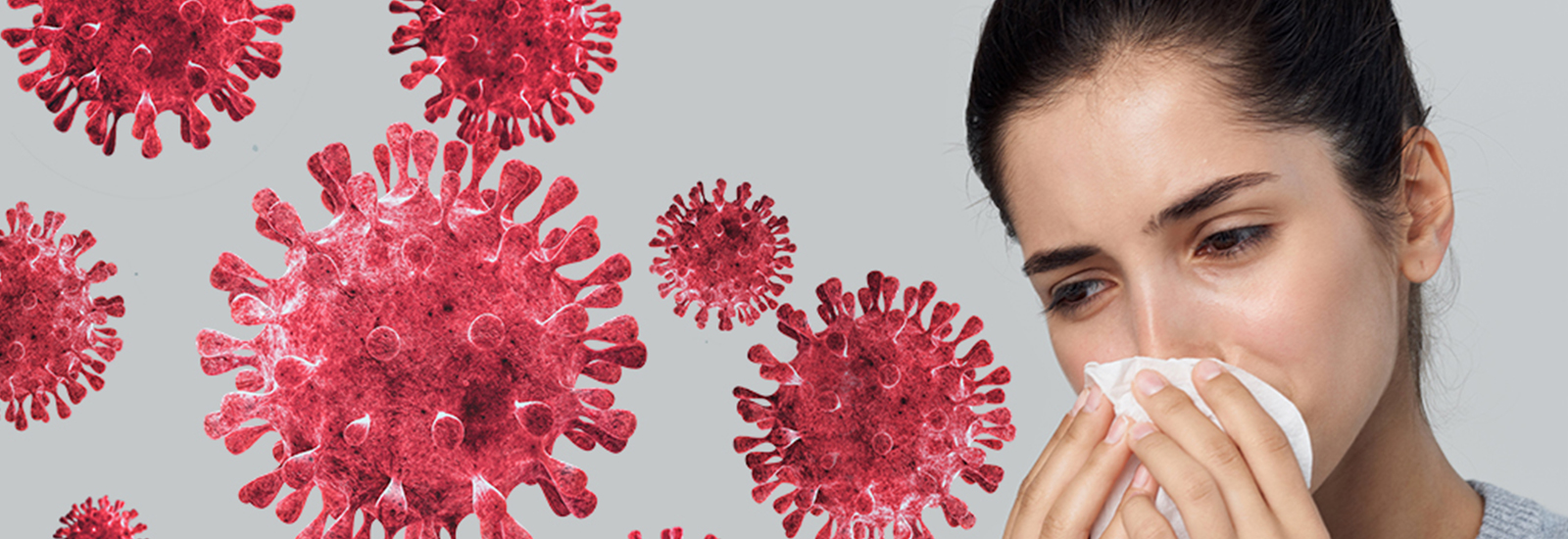In an effort to help our community be prepared for the rapidly evolving new coronavirus disease 2019 (COVID-19) outbreak, Houston Physicians’ Hospital assembled the following information from the Center for Disease Control (CDC) and the Texas Department of State Health Services to answer your most common questions about COVID-19 and the vaccination information.
Is Houston Physicians’ Hospital treating Coronavirus Disease 2019 (COVID-19) patients?
No. All patients who come to Houston Physicians’ Hospital seeking treatment will be triaged and stabilized then transferred to one of our area’s neighboring hospitals if necessary.
Where can I get vaccinated for COVID-19?
Here is a link where you can find out more about Texas Covid Vaccine Providers for 1A and 1B categories:
https://txdshs.maps.arcgis.com/apps/webappviewer/index.html?id=91ac7fb5e5fd47e7ada4acfe4a05920a
What are guidelines around travel during a pandemic? 
- General Travel: https://wwwnc.cdc.gov/travel
Travel Planning: https://www.cdc.gov/coronavirus/2019-ncov/travelers/travel-planner/index.html - Travel restrictions and further details of risks 0-4
https://www.cdc.gov/coronavirus/2019-ncov/travelers/map-and-travel-notices.html
Will Houston Physicians’ Hospital be providing testing for Coronavirus Disease 2019 (COVID-19) patients?
No. Houston Physicians’ Hospital will not be providing testing for Coronavirus Disease 2019 (COVID-19). Patients seeking testing will be referred to one of our area’s neighboring hospitals.
What are the differences in the types of masks and which ones are most effective?
People are wearing a variety of masks from cloth masks to N95 disposable masks. The N95 masks are the most effective, but most masks do provide a certain level of protection. If you choose a cloth mask, make sure it’s tightly woven and fits snug against your face. And make sure it does not have an exhalation valve. These valves do not have a filter and, while more comfortable for the wearer, they do not provide adequate protection for anyone in close contact with them.
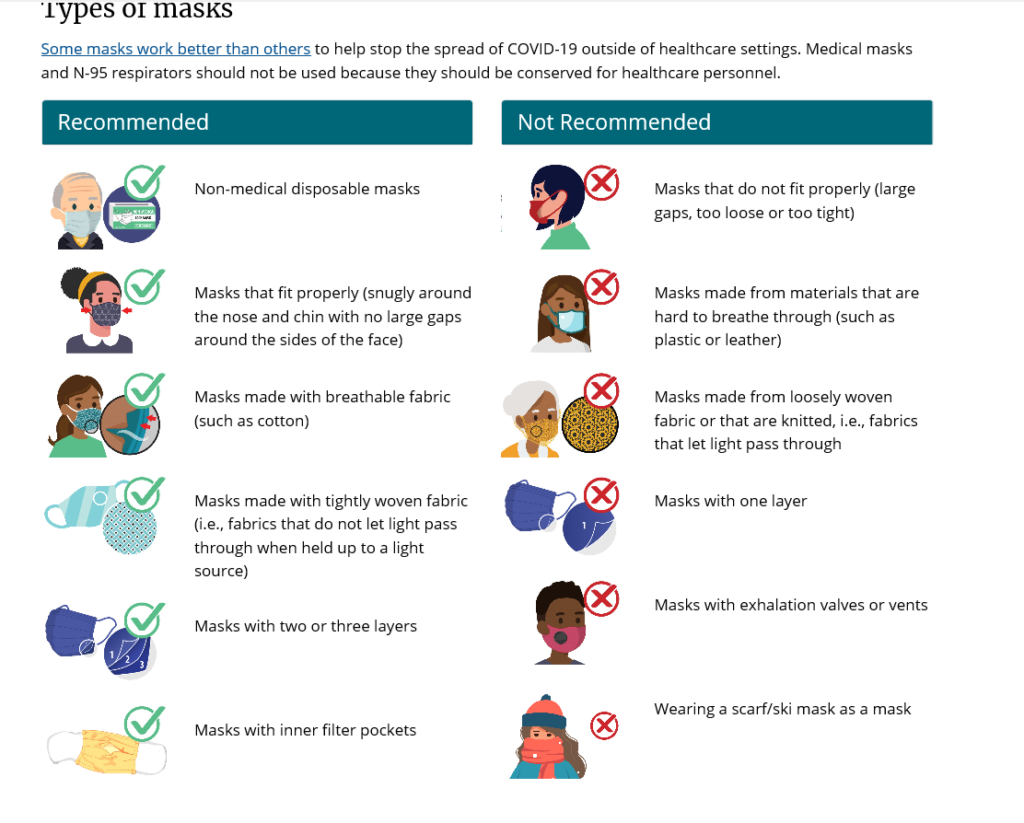
What is the COVID-19 or Coronavirus Disease 2019?
Originally identified in Wuhan, Hubei Province, China, COVID-19 or The Coronavirus Disease 2019 is a new respiratory virus that is believed to have been transmitted to humans from a wild animal. Currently, the virus is most commonly being spread by human-to-human transmission.
You may read more about the COVID-19 at the CDC website:
What are COVID-19’s symptoms?
Since COVID-19 is an upper respiratory illness with symptoms that are very similar to other viral mild or severe respiratory illness including the flu, the common cold or allergies since pollen counts are high. The symptoms which may appear between two to 14 days after exposure include:
- Fever
- Cough
- Difficulty breathing/shortness of breath
Serious symptoms of COVID-19 include:
- Severe shortness of breath
- Low blood pressure
- Elevated heart rate (above 100 bpm)
- Dehydration
- Profound weakness
- High fever
How does COVID-19 spread?
Person-to-Person: The most common way COVID-19 is spread is person to person. When someone is infected and they cough or sneeze, like any other viral respiratory illness, the infected person disperses small respiratory droplets which another person inhales into to their lungs. When people are in close contact—within about 6 feet—of one another, they are thought to be more vulnerable. People are thought to be the most contagious when they are most symptomatic (the sickest); however, there have been reports of spreading prior to people showing symptoms.
Surface Contact: The other less common way COVID-19 can spread is when someone who is infected sneezes or coughs respiratory droplets on to objects or surfaces around them. A person can catch the virus when they touch a contaminated surface or object, then touch their eyes, nose or mouth.
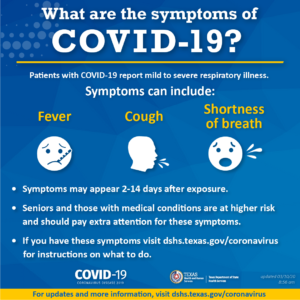
How long can COVID-19 survive on surfaces?
COVID-19 seems to behave like other coronaviruses and studies suggest that it may persist on surfaces for anywhere between a few hours up to several days. If you think a surface may be infected, clean it with simple disinfectant to kill the virus and protect yourself and others.
What’s the difference between COVID-19 and other Coronaviruses?
Coronaviruses are not new. In fact, there are several common varieties that cause respiratory illness like the common cold.
You may have heard of novel coronavirus which, according to the CDC, is a new coronavirus that has not been previously identified. The virus causing COVID-19 is not the same as the more common Coronavirus 229E, NL63, OC43, or HKU1, the more common corona viruses which cause mild illness like the common cold.
COVID-19 patients will be evaluated and cared for differently than patients with the other more common coronavirus diagnosis.
How Is COVID-19 Diagnosed?
If you’ve possibly been exposed to the virus and are experiencing symptoms, your doctor will work with the city health department and the CDC to determine if you need to be tested for COVID-19.
To test for COVID-19, your doctor will likely collect a saliva sample, as well as nasal and throat swabs.
How can I be tested for COVID-19?
If you suspect you may have COVID-19 and would like to consult with a healthcare provider, you are encouraged to use telemedicine and virtual care options (if available).
NOTE: Houston Physicians’ Hospital will not be providing testing for Coronavirus Disease 2019 (COVID-19). Patients seeking testing will be referred to one of our area’s neighboring hospitals.
What happens if I test positive for Coronavirus?
Call your doctor immediately if you suspect that you have COVID-19. If you are confirmed that you have COVID-19, Houston Physicians’ Hospital recommends that you consult your doctor to determine if you should either self-quarantine or seek medical attention.
Who is most at risk for contracting COVID-19?
For most people in the Greater Houston area, the risk of exposure to COVID-19 is considered low. However, your risk increases if:
- you have traveled to China or affected areas as pinpointed by the CDC*, within the applicable time period.
- you have had contact with someone who is under investigation for COVID-19 or has been confirmed with the virus.
* Current high-risk countries include China, Iran, Italy, Japan, and South Korea — but we recommend regularly checking the Centers for Disease Control’s COVID-19 risk assessment by country.
What do I do if I think I’m sick with COVID-19?
If you think you’ve contacted COVID-19 and your experiencing minor symptoms, there are some things you can do to help yourself and protect others in your community:
- The Center for Disease Control recommends that you self-quarantine for at least 14 days and use telemedicine or virtual care options (if available) to get a consult from your healthcare provider. This means:
- Stay home except for getting medical care
- Avoid public areas including work, school and shopping centers
- Avoid public transportation, ride-sharing or taxis
- Separate yourself from other people and animals in your home. This means using a separate bathroom if it’s available.
- Cover your mouth and nose with a tissue when you cough or sneeze and throw the tissue into a lined trash can. Wash your hands with soap and water for at least 20 seconds or hand sanitizer with at least 60% alcohol immediately afterward.
- Don’t touch your eyes, nose and mouth with unwashed hands.
- Don’t share household items like dishes, drinking glasses, cups, utensils towels and bedding with other people in your home. Wash these items thoroughly after use.
- Clean all high touch surfaces like counters, tabletops, doorknobs, bathroom fixtures, keyboards, tablets and bedside tables everyday
- If you’re sick, wear a facemask when you’re around others—especially in close proximity like a car or public transportation.
- If your symptoms become more severe, seek medical attention immediately. Call your doctor and tell them that you have or are being evaluated for COVID-19. If need be, go to your nearest emergency room. If you can, call your ER prior to arriving and let them know that you may have COVID-19. Dial 911 if you need more urgent emergency care.
- You can discontinue home isolation once the risk of secondary transmission is low. Consult your healthcare providers and state and local health departments for more guidance.
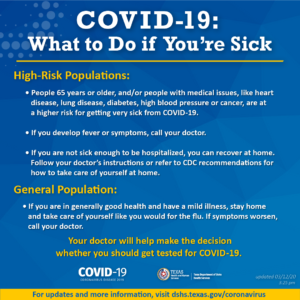
- Don’t touch your eyes, nose and mouth with unwashed hands.
- Don’t share household items like dishes, drinking glasses, cups, utensils towels and bedding with other people in your home. Wash these items thoroughly after use.
- Clean all high touch surfaces like counters, tabletops, doorknobs, bathroom fixtures, keyboards, tablets and bedside tables everyday
- If you’re sick, wear a facemask when you’re around others—especially in close proximity like a car or public transportation.
- If your symptoms become more severe, seek medical attention immediately. Call your doctor and tell them that you have or are being evaluated for COVID-19. If need be, go to your nearest emergency room. If you can, call your ER prior to arriving and let them know that you may have COVID-19. Dial 911 if you need more urgent emergency care.
- You can discontinue home isolation once the risk of secondary transmission is low. Consult your healthcare providers and state and local health departments for more guidance.
How is COVID-19 treated?
There is no treatment for COVID-19. However, infected individuals can relieve symptoms, via
- Pain relievers and fever reducers
- Cough medications
- Rest
- Hydration
It’s recommended that you stay isolated at home while sick and ask family members or friends to pick up any over-the-counter medications you may need.
More serious cases of COVID-19 may need to be treated in the hospital. If you’re experiencing severe symptoms, we recommend going directly to an emergency room.
How do I protect myself and others from getting COVID-19?
Since there is currently no vaccine against COVID-19, you can prevent the spread of the virus by avoiding being exposed to it and taking precautions to make sure are protecting others. This means:
- Avoid contact with people who are sick.
- Don’t touch your eyes, nose and mouth with unwashed hands.
- If you’re sick, stay home.
- If you have to cough or sneeze, cover your mouth and nose with a tissue, throw the tissue away and thoroughly wash your hands.
- Make sure surfaces and objects that you touch are cleaned and disinfected with regular household cleaning sprays or wipes.
- Wash your hands often with soap and water for at least 20 seconds, especially after going to the bathroom; before eating; and after blowing your nose, coughing or sneezing. If soap and water are not readily available, use an alcohol-based hand sanitizer with at least 60% alcohol.
- If you’re not sick, you don’t need to wear a facemask—save them for healthcare providers as they are in short supply.
DSHS Commissioner Hellerstedt speaks about how Texans can prevent coronavirus disease 2019 (COVID-19).
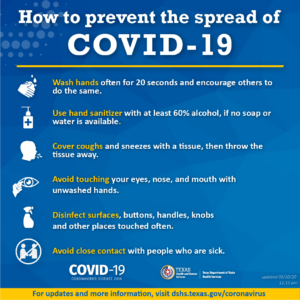
Is there anything I can take to protect me from getting COVID-19?
No. Currently, there is no vaccine to prevent COVID-19, but researchers around the globe are working on antivirals.
Some people are taking Tamiflu, which is a drug that treats the flu, but it is not a vaccine, so it will not protect you from getting the virus.
Should I cancel my travel plans?
If you have upcoming travel plans we suggest regularly checking the CDC’s COVID-19 risk assessment by country and following their recommendations.
Can I safely receive mail from an area that has confirmed cases of the Coronavirus?
Yes. The risk of an infected person contaminating commercial goods and you catching the virus from a package that’s been in transit—even internationally—is very low.
What is Houston Physicians’ Hospital doing to protect patients, visitors and staff from Coronavirus?
Houston Physicians’ Hospital makes the safety and well-being of our employees, physicians, patients and community our top priority. During this pandemic, we have increased our vigilance to keep everyone safe implementing a workforce protocol based on CDC guidelines which includes screening all members of our workforce—whether full time, part-time or contract.
Based on our screening results, we will provide information on immediate hospital care or mandatory leave for employees for up to 14 days as necessary.
How is Houston Physicians’ Hospital preventing the potential spread of COVID-19 to patients, visitors, physicians and hospital staff?
Houston Physicians’ Hospital has modified its visitor policy and implemented a restricted access protocol effective Tuesday, March 10, at 7 a.m. until further notice. This policy limits the number of visitors per patient restricts the number of access points and implements screening for all visitors.
- No visitors allowed at this time. Children 18 and under are allowed one adult to accompany them.
- All visitors and patients, including vendors and contractors, will be screened at designated entry points, including the Emergency Center.
Visitors who are sick or do not meet screening criteria will not be allowed to enter the hospital.
Who may I contact with questions on Coronavirus Disease 2019 (COVID-19) when my physician is not available?
If you have questions regarding Coronavirus Disease 2019 (COVID-19), the Houston Health Department call center is available weekdays from 9 a.m. to 7 p.m. and Saturdays from 9 a.m. to 3 p.m. They will also return voice messages left after hours on the following day:
Harris County Health Department
- 281-342-6414
- After hours: 281-434-6494
Montgomery County Health Department
- 936-523-5026
- After hours: 888-825-9754
Fort Bend County Health Department
- 281-3426414
- After hours: 281-434-6494
Chambers County Health Department
- 409-267-2731
- After hours: 409-267-9862
Brazoria County Health Department
- 979-864-2168
- After hours: 800-511-1632


